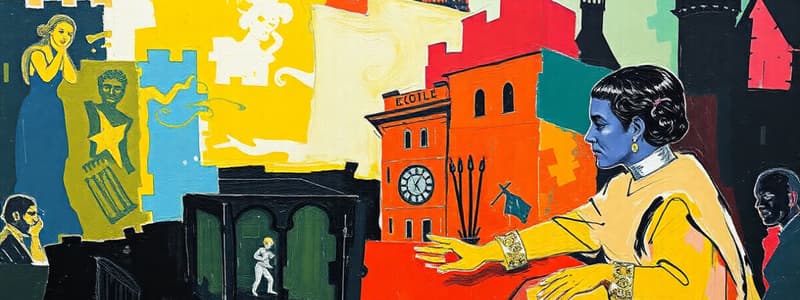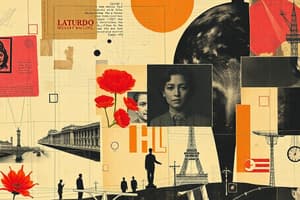Podcast
Questions and Answers
Which characteristic primarily defines the fragmented experience in literature?
Which characteristic primarily defines the fragmented experience in literature?
- Linear storytelling
- Chronological progression
- Traditional narrative structures
- Stream-of-consciousness narration (correct)
What theme is frequently explored in postmodern literature?
What theme is frequently explored in postmodern literature?
- Idealized representations of reality
- Communal truths
- Unquestionable truth
- Rejection of grand narratives (correct)
Which author is NOT typically associated with the postmodern literary period?
Which author is NOT typically associated with the postmodern literary period?
- Toni Morrison
- Salman Rushdie
- Margaret Atwood
- James Joyce (correct)
What critical approach focuses on the author's life and societal influences?
What critical approach focuses on the author's life and societal influences?
Which theme addresses the complex dynamics of personal and societal identity?
Which theme addresses the complex dynamics of personal and societal identity?
In which literary genre are characters and plots extended over a longer narrative?
In which literary genre are characters and plots extended over a longer narrative?
Which critical approach analyzes literature based on its historical context?
Which critical approach analyzes literature based on its historical context?
What theme explores the ethical dilemmas and moral complexities present in human experiences?
What theme explores the ethical dilemmas and moral complexities present in human experiences?
Which form of literature primarily uses dialogue and action to tell its stories?
Which form of literature primarily uses dialogue and action to tell its stories?
Which literary approach would analyze how literature reflects the experiences of colonization?
Which literary approach would analyze how literature reflects the experiences of colonization?
Which characteristics best represent the Medieval Period in English literature?
Which characteristics best represent the Medieval Period in English literature?
Which authors are primarily associated with the Renaissance Period?
Which authors are primarily associated with the Renaissance Period?
What central theme distinguishes the Romantic Period from previous literary movements?
What central theme distinguishes the Romantic Period from previous literary movements?
Which of the following best defines Neoclassical literature's key focus?
Which of the following best defines Neoclassical literature's key focus?
What characterizes the Victorian Period's approach to literature?
What characterizes the Victorian Period's approach to literature?
Which term most accurately describes the thematic concerns of Modernist literature?
Which term most accurately describes the thematic concerns of Modernist literature?
Which work is a notable example representative of the Medieval Period?
Which work is a notable example representative of the Medieval Period?
What movement emphasizes the rediscovery of classical art and literature?
What movement emphasizes the rediscovery of classical art and literature?
Which period is characterized by the rejection of excessive emotionalism found in prior styles?
Which period is characterized by the rejection of excessive emotionalism found in prior styles?
During which period did key writers explore themes of human potential and love?
During which period did key writers explore themes of human potential and love?
Flashcards
What is English Literature?
What is English Literature?
The body of written works in the English language, spanning centuries and reflecting diverse cultural, social, and historical contexts.
What is the Medieval Period?
What is the Medieval Period?
A period in English literary history characterized by religious themes, feudal society, and the rise of chivalry.
What is the Renaissance Period?
What is the Renaissance Period?
A period marked by the rediscovery of classical Greek and Roman literature and art. It emphasized humanism, exploration, and the flourishing of drama.
What is the Neoclassical Period?
What is the Neoclassical Period?
Signup and view all the flashcards
What is the Romantic Period?
What is the Romantic Period?
Signup and view all the flashcards
What is the Victorian Period?
What is the Victorian Period?
Signup and view all the flashcards
What is the Modernist Period?
What is the Modernist Period?
Signup and view all the flashcards
What are the primary forms of English literature?
What are the primary forms of English literature?
Signup and view all the flashcards
What are the key characteristics of the Medieval Period?
What are the key characteristics of the Medieval Period?
Signup and view all the flashcards
What are the key themes of the Renaissance Period?
What are the key themes of the Renaissance Period?
Signup and view all the flashcards
Modernism
Modernism
Signup and view all the flashcards
Stream-of-consciousness
Stream-of-consciousness
Signup and view all the flashcards
Postmodernism
Postmodernism
Signup and view all the flashcards
Rejection of Grand Narratives
Rejection of Grand Narratives
Signup and view all the flashcards
Biographical Criticism
Biographical Criticism
Signup and view all the flashcards
Historical Criticism
Historical Criticism
Signup and view all the flashcards
Feminist Criticism
Feminist Criticism
Signup and view all the flashcards
Psychoanalytic Criticism
Psychoanalytic Criticism
Signup and view all the flashcards
New Historicism
New Historicism
Signup and view all the flashcards
Postcolonial Criticism
Postcolonial Criticism
Signup and view all the flashcards
Study Notes
Overview of English Literature
- English literature encompasses a diverse range of written works in English, reflecting various cultural, social, and historical contexts across centuries.
- It includes poetry, drama, novels, short stories, and other forms of literary expression.
- Key periods and movements, such as the Middle Ages, Renaissance, Neoclassicism, Romanticism, Victorian period, Modernism, and Postmodernism, showcase distinct thematic concerns and stylistic features.
Key Periods and Movements
- Medieval Period (c. 1100-1485):
- Characterized by religious themes, feudal society, and the rise of chivalry.
- Notable works include Sir Gawain and the Green Knight, The Canterbury Tales, and religious texts like The Pearl.
- Stylistic features include alliterative verse, allegorical imagery, and reflections of medieval social structures.
- Renaissance Period (c. 1485-1660):
- Influenced by classical Greek and Roman literature and art, emphasizing humanism, exploration, and dramatic works.
- Notable writers include Shakespeare, Marlowe, and Spenser.
- Key themes include human potential, love, and conflict.
- Neoclassical Period (c. 1660-1785):
- Emphasizes reason, order, and balance, drawing from classical ideals.
- Notable figures include Pope, Swift, and Johnson.
- Represents a rejection of the emotional excesses of the Baroque period.
- Romantic Period (c. 1785-1830):
- Emphasizes emotion, imagination, and individualism, reacting against Enlightenment's focus on reason.
- Celebrates nature, the sublime, and the strength of the human spirit.
- Key authors include Wordsworth, Coleridge, Byron, and Keats.
- Victorian Period (c. 1837-1901):
- Characterized by industrialization, social change, and the rise of the middle class.
- Explores topics like social reform, morality, and the depths of human nature.
- Notable authors include Dickens, Austen, Emily and Charlotte Brontë.
- Modernist Period (c. 1900-1945):
- Reacts against Victorian values and pre-World War I stability.
- Focuses on fragmented experience, alienation, and loss of faith in established institutions.
- Notable authors include Joyce, Woolf, Eliot, and Fitzgerald, utilizing innovative styles like stream-of-consciousness.
- Postmodern Period (c. 1945-Present):
- Challenges traditional notions of truth, meaning, and the role of the artist.
- Diverse period, marked by experimentation in form and perspective.
- Rejects grand narratives, valuing subjectivity and irony.
- Significant authors include Morrison, Rushdie, and Atwood.
Key Literary Genres
- Poetry: Explores emotions and ideas through imagery, rhythm, and form.
- Drama: Presents stories through dialogue and action, often for stage performance.
- Novels: Extended narratives analyzing characters, plots, and themes.
- Short Stories: Brief narratives focusing on specific events and characters.
- Essays: Non-fiction works presenting personal viewpoints or arguments.
Key Critical Approaches
- Biographical Criticism: Examines a literary work through the author's life and experiences.
- Historical Criticism: Analyzes literary works within their historical contexts.
- Feminist Criticism: Examines the roles and portrayals of women in literature.
- Psychoanalytic Criticism: Applies psychoanalytic theories to understand characters and texts.
- New Historicism: Examines the relationships between texts and historical events.
- Postcolonial Criticism: Studies literature reflecting colonization and post-colonial experiences.
- Cultural Materialism: Explores how literature reflects social, cultural, and economic realities.
Significant Themes in English Literature
- Love, loss, and relationships
- Identity and belonging
- Social class and inequality
- Power and corruption
- Nature and environment
- War and conflict
- Morality and ethics
- Religion and spirituality
- The human condition
- Exploration and discovery
Studying That Suits You
Use AI to generate personalized quizzes and flashcards to suit your learning preferences.




